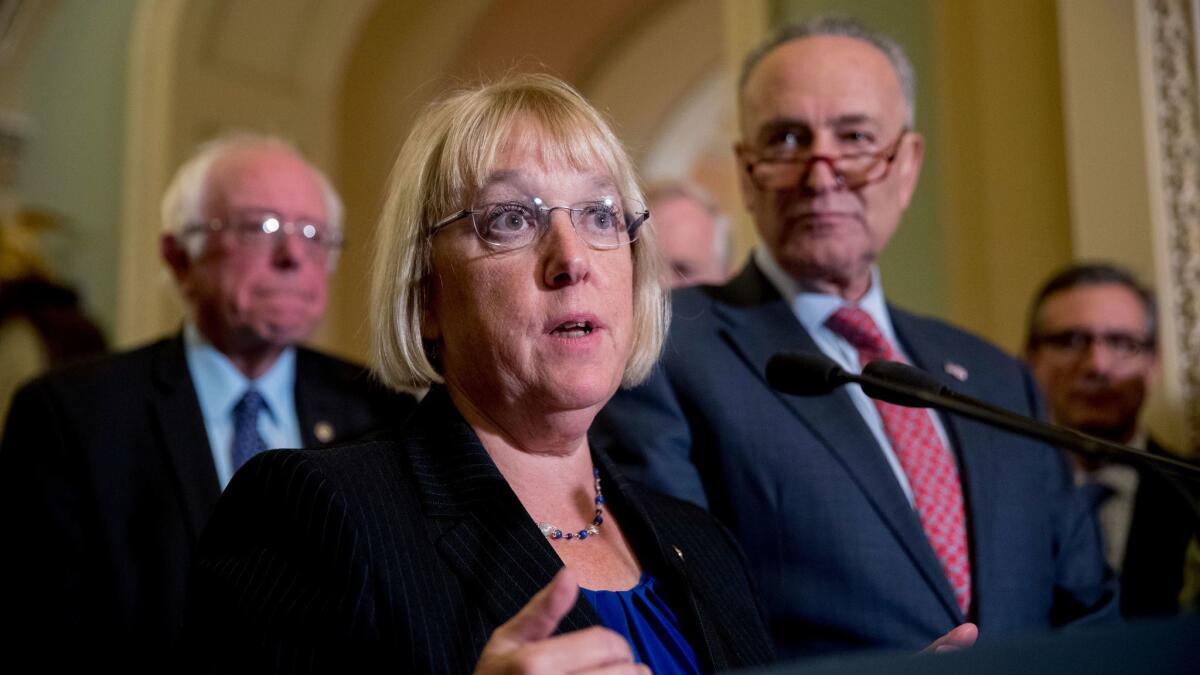Column: Two senators announce a bipartisan deal on Obamacare, but don’t celebrate yet

In a window into how the U.S. Senate should actually work, two senators — a Republican and a Democrat — announced a bipartisan deal Tuesday to save some provisions of the Affordable Care Act from the Trumpian butcher block.
Don’t celebrate quite yet. The window into bipartisan comity is only narrowly cracked open, as yet. The details of the deal are still murky, but plainly it won’t undo some of the damage done to the ACA by the Trump administration over the last nine months. And conservative Republicans are already grousing that it’s too accommodating to a program that has brought health coverage to 20 million Americans.
The headline provision of the deal ostensibly reached by Sens. Lamar Alexander (R-Tenn.), chairman of the Senate Health Committee, and Patty Murray (D-Wash.), its ranking Democratic member, concerns the cost-sharing reduction payments unilaterally canceled last week by President Trump. The payments are made to insurance companies to reimburse them for reductions in deductibles, co-pays and other out-of-pocket expenses given to about 7 million low-income buyers on the ACA exchanges.
The uncertainty and the dysfunction cannot continue.
— Sen. Patty Murray (D-Wash.)
The deal reportedly continues those payments for up to two years. Trump’s action would have cut off the payments immediately, causing billions of dollars of losses to insurance companies and leaving the door open to the immediate termination of policies affecting millions of Americans.
The deal reportedly also restores more than $100 million in federal funding for marketing and outreach for the ACA’s open-enrollment period, which runs from Nov. 1 to Dec. 15. That funding had been terminated by the Trump administration, raising fears that enrollments would fall because of a lack of information for applicants. The cutback was part of the administration’s concerted attack on the ACA, which Trump has said he expects to “explode” or “implode.”
“Democrats feel like there are protections there,” Alexander said. “At the same time, we give significant flexibility to states.” Murray depicted the agreement on cost-sharing reductions as a major pillar of the deal. “The uncertainty and the dysfunction cannot continue,” she said.
Still unclear are other details of the agreement. Murray and Alexander indicated that it would expand to all buyers the option to purchase “catastrophic” health coverage, which under the ACA is only available to buyers under age 30 or those with no other affordable coverage options. Catastrophic plans typically carry lower premiums than full-coverage plans, but much higher deductibles. That makes them more affordable up-front, but less serviceable for many buyers, as they expose policyholders to high out-of-pocket expenses in the case of illness or serious injury.
Some critics also were concerned that catastrophic plans would siphon younger and healthier buyers from the overall risk pool, driving up premiums for other buyers, but early reports indicate that the newly-available plans would be part of the overall risk pool.
Alexander told reporters that the agreement anticipates giving states greater flexibility in crafting so-called Section 1332 waivers, which allow states to circumvent limited provisions of the ACA as long as their changes don’t result in less affordable access to health coverage or fewer benefits. But he was unclear on where the flexibility would appear. Some Republican measures aimed at repealing the ACA this year would have allowed states to eliminate the ACA’s required minimum benefits, which include maternity care, mental health services and prescription drug coverage. The Alexander-Murray agreement isn’t expected to go that far.
Trump indicated support for the deal, without displaying much grasp of its details. “This is a short-term deal because we think ultimately block grants going to the states is going to be the answer,” Trump said. Healthcare experts have observed, however, that block grants almost always are designed to reduce funding over time, and lack the funding flexibility often needed in public health crises.
There are no signs that the agreement will do anything to quell the hostility shown by the Trump administration to the Affordable Care Act generally.
Since taking office, Trump has sliced the open-enrollment period for 2018 plans in half, from the customary three months ending Jan. 30, to six weeks ending Dec. 15. He cut the outreach and marketing budget by 90% — only some of which would be restored by the Senate agreement. Spending of the restored funds presumably would remain under the control of Trump’s Department of Health and Human Services, raising doubts about whether the money would be spent effectively.
Trump also has discouraged enforcement of the ACA’s all-important individual mandate, which requires individuals and families to carry health insurance or pay a financial penalty. He has kept up a rhetorical attack on the ACA in all its details.
As recently as last Thursday, Trump took a significant step toward undermining the ACA marketplace with an executive order calling on three federal agencies to work on expanding association and short-term health plans, which are exempt from many provisions of the Affordable Care Act. Such plans also would siphon healthy buyers from the ACA pool, but without providing them with comprehensive health benefits.
The Alexander-Murray agreement is the strongest indication yet that a bloc of lawmakers accepts that the Affordable Care Act remains in place and that the responsible approach is to ensure that it works, rather than to sabotage it through executive action. They still must run the legislative gauntlet in the House and Senate, where the deal’s fate is up for grabs. Some conservative senators already have expressed doubts.
Keep up to date with Michael Hiltzik. Follow @hiltzikm on Twitter, see his Facebook page, or email [email protected].
Return to Michael Hiltzik’s blog.
More to Read
Sign up for Essential California
The most important California stories and recommendations in your inbox every morning.
You may occasionally receive promotional content from the Los Angeles Times.











